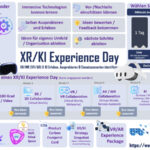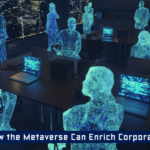As manufacturers look to digital transformation to streamline operations and gain a competitive edge, extended reality (XR) and the metaverse are emerging as powerful technologies that can drive efficiency, collaboration, and innovation. From immersive training environments to virtual prototyping, manufacturers are exploring the potential of these tools to revolutionize every aspect of the production process.
In a recent study surveying more than 600 manufacturing decision-makers, the XR Association found that respondents believe XR technology can be used across the manufacturing workstream:
- Quality control
- Product design and prototyping
- Encouraging remote collaboration
- Improving customer engagement and sales
Real-Time Monitoring and Simulations
At the heart of the industrial metaverse is the ability to create virtual spaces that replicate real-world operations, allowing for real-time monitoring and simulations. Digital twins, a core technology within this space, are virtual counterparts of physical assets or processes that enable manufacturers to visualize, test, and optimize their systems in a virtual environment.
For example, a digital twin of a production line can simulate various scenarios, helping manufacturers identify potential bottlenecks, predict equipment maintenance needs, and manage risks before they occur. This ability to perform real-time analysis and scenario testing enhances decision-making and allows manufacturers to implement proactive solutions that optimize efficiency and reduce downtime.
Efficient Risk Management and Streamlined Product Development
The industrial metaverse offers significant advantages in product development and risk management. By using digital twins during the design phase, manufacturers can conduct simulations that identify potential issues early in the development process. This allows for faster iterations, reduces costly mistakes, and shortens time-to-market.
Additionally, these technologies allow manufacturers to visualize their entire supply chain in a virtual space, enabling faster responses to disruptions and enhancing overall supply chain resilience. This capability has become increasingly important in today’s global market, where supply chain issues can have significant financial and operational impacts.
For example, The Ricoh Group is amid a digital transformation that has them collecting and processing data, using that data for digital twins, and using these immersive technologies to streamline manufacturing operations.
Advanced Training and Addressing Labor Shortages
XR and the industrial metaverse are also playing a critical role in workforce development. Virtual reality-based training environments allow workers to practice complex tasks in a safe, controlled setting, accelerating skills development and reducing the risks associated with on-the-job training. This is particularly valuable for industries with hazardous working environments, where mistakes can be costly or dangerous.
In the XR Association’s study, 37% of decision makers believe that XR can address workforce skill gaps by significantly reducing skill acquisition. 47% of respondents believe XR will create new career advancement opportunities. Manufacturing decision-makers indicated that XR will deliver a positive ROI for several areas related to workforces:
- Employee training
- Employee recruitment
- Employee retention
Moreover, the industrial metaverse enables remote operation of physical equipment in real-time. This capability helps alleviate labor shortages by allowing skilled workers to operate machinery and manage production processes remotely, reducing the need for a physical presence on the production floor.
The Ricoh Group is deploying XR for technical skills and training. Employees can use VR goggles to view training scenarios from an expert’s point of view, leading to observable improvements in work efficiency.
Challenges and Future Prospects
While the potential of the industrial metaverse is endless, there are challenges that need to be addressed for widespread adoption. These include significant investments in technology infrastructure, talent development, and data security. Additionally, enhancing user experience (UX) and ensuring seamless integration with existing systems will be critical to fully realizing the benefits of these technologies.
In the XR Association’s study, the most pressing challenges were:
- Data privacy and security
- Expense to adopt
- Logistic challenges
To succeed today and in the future, manufacturers must adopt a long-term vision for digital transformation. This involves not only investing in XR and metaverse technologies but also fostering a culture of continuous learning and innovation. Upskilling workers, strengthening IT infrastructure, and promoting collaboration across departments are essential for harnessing the full potential of the industrial metaverse.
Conclusion
The industrial metaverse represents a new era in digital transformation for the manufacturing industry, offering real-time simulations, immersive training, and optimized product development. By embracing XR technologies and digital twins, manufacturers can drive efficiency, improve risk management, and create more sustainable operations. While there are challenges to overcome, the companies that invest in these innovations will be better positioned to thrive in an increasingly competitive global market. The future of manufacturing is immersive, data-driven, and powered by the industrial metaverse.
Quelle:
https://innovateenergynow.com/resources/transforming-manufacturing-with-xr-and-the-metaverse



